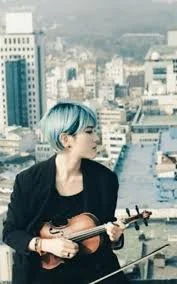
Meet South Korean Violinist and singer Echae Kang
1.Please describe how you came to violin in general, and then fiddling/alternative styles of violin. Perhaps explore how the environment, people, culture, and other factors were involved.
I got a violin as a birthday present when I was six years old, and I loved playing it from that moment on. I've never stopped since then.
I first discovered gypsy music in middle school when I stumbled upon a video of some musicians playing Django Reinhardt’s “Minor Swing” on the beach. That moment sparked my interest. Later, in my senior year of high school, I became even more immersed in gypsy music. I decided to move away from classical music and started studying jazz.
2. What made you decide to come to the US and Berklee? What did you feel like you learned from this experience?
When I was looking into colleges during high school, there were almost no non-classical violin teachers in Korea. A jazz pianist I knew introduced me to Berklee, mentioning that they had a great string department. I also heard that Berklee was coming to Seoul for their Asian audition tour, which made it easier for me to audition without too much pressure.
My four years at Berklee were filled with music and enriched by amazing friends and teachers. It was truly a vibrant musical experience.
3. How would you compare jazz/other music in Korea (and Korean jazz/alternate style fusion) with other styles of the world?
I’m not sure how it is for new musicians debuting now, but when I started performing in Seoul about ten years ago, the lines between jazz and alternative musicians weren’t that distinct. Musicians from different genres blended well together and often shared the same venues.
The audience also appreciated a variety of styles—jazz, funk, pop, rock—without strict boundaries. They enjoyed the music itself regardless of genre.
4. What was your inspiration for Dear Jazz Orchestra? What are your inspirations for the music you write for the ensemble?
The inspiration behind Dear Jazz Orchestra comes entirely from Eugene Friesen, my mentor and teacher. I have such fond memories of playing in the Berklee World Strings, which he founded. After returning to Korea and exploring different styles of music, I found myself longing to recreate that orchestra experience. However, there wasn’t an existing group like that here, and I needed a conductor to lead it. When I couldn’t find one, I decided to start the group myself, even though I wasn’t an experienced conductor.
In Korea, there are so many talented string players, and I began looking for musicians who were passionate about playing beyond classical music. That’s how the orchestra came together.
We started by playing Eugene Friesen’s scores and other wonderful pieces he introduced to us, exploring new directions for string music while developing our ensemble.
There’s such a big joy in coming together and making music as a group. Most of the time, when I write or arrange music for Dear Jazz Orchestra, I just think of our faces and the time we share together.
Over time, I began composing pieces that reflected our unique sound and also commissioned works from other musicians. We organized our own performances, played at various festivals, connected with fans, and even released multiple albums.
5. What makes you so passionate about violin and is there perhaps a vision you would like to share that you have for the future?
The violin, and string instruments in general, are quite challenging to express yourself with, but that difficulty also means they allow for a very refined and personal expression.
Because I started playing at such a young age, my thoughts and the violin have grown together. It feels like a part of me. That’s why I keep exploring it more deeply and why I feel so connected to its sound.
Music always feels challenging and difficult to work with, but the more I do it, the more I hope my thoughts and expressions can flow freely into my music.
The violin, which is probably my greatest partner, plays a big role in that. I also feel that other instruments are gradually joining this journey with the violin.
Without boundaries of genre, field, or color, I want to become a musician who can naturally express my life through my music.
And I hope that my journey can be a source of hope, even in a small way, for others who are walking or just starting on a similar path.




